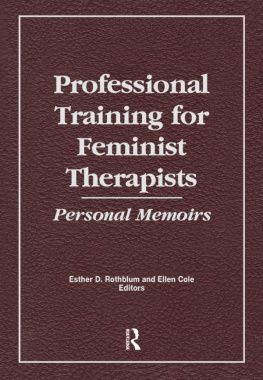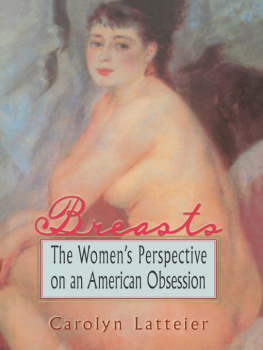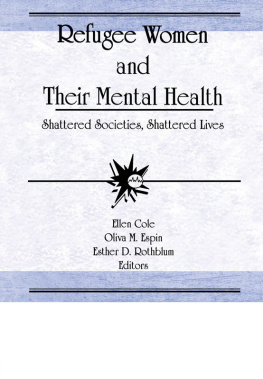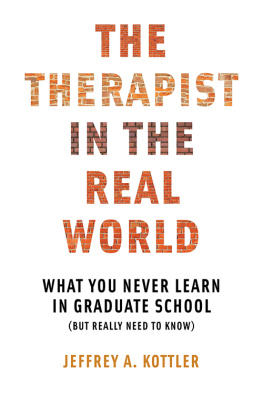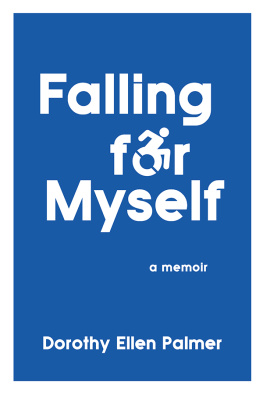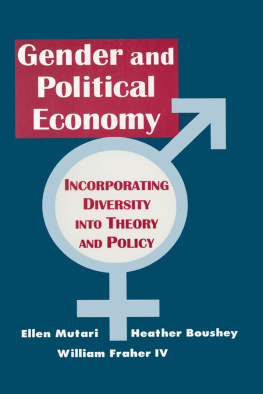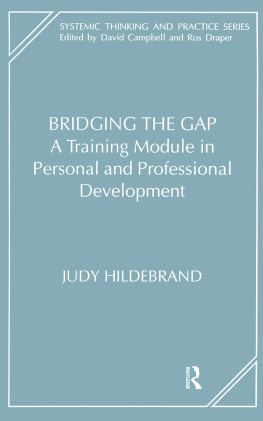Professional Training for Feminist Therapists: Personal Memoirs
Professional Training for Feminist Therapists: Personal Memoirs
Esther D. Rothblum Ellen Cole Editors
First published 1991 by Haworth Press, Inc.
Published 2018 by Routledge
2 Park Square, Milton Park, Abingdon, Oxon 0X14 4RN
52 Vanderbilt Avenue, New York, NY 10017
Routledge is an imprint of the Taylor & Francis Group, an informa business
Copyright 1991 Taylor & Francis
All rights reserved. No part of this book may be reprinted or reproduced or utilised in any form or by any electronic, mechanical, or other means, now known or hereafter invented, including photocopying and recording, or in any information storage or retrieval system, without permission in writing from the publishers.
Notice:
Product or corporate names may be trademarks or registered trademarks, and are used only for identification and explanation without intent to infringe.
Professional Training for Feminist Therapists: Personal Memoirs has also been published as Women & Therapy, Volume 11, Number 1 1991.
Library of Congress Cataloging-in-Publication Data
Professional training for feminist therapists: personal memoirs/Esther D. Rothblum, Ellen Cole, editors.
p. cm.
Published also as v. 11, no. 1 of Women & therapy.
ISBN 1-56024-123-3 (acid-free paper)
1. Women psychotherapists Training ofUnited States. 2. Women psychotherapists United States Biography. 3. Feminists United States Biography. I. Rothblum, Esther D.
II. Cole, Ellen.
RC459.5.U6P76 1991
616.89 14082 - dc20 90-26555
CIP
ISBN 13: 978-1-56024-123-2 (hbk)
ISBN 13: 978-1-138-98389-2 (pbk)
Professional Training for Feminist Therapists: Personal Memoirs
CONTENTS
Esther D. Rothblum
Ellen Cole
Naomi B. McCormick
Marcelle R. Adolph
Julia Sherman
Hannah Lerman
Jean Shinoda Bolen
Judith J. Frankel
Michele Clark
Robbie J. Steward
Toni Napoli
Laura L. Post
Six Spoke Collective
Melissa J. Perry
ABOUT THE EDITORS
Esther D. Rothblum, PhD, is Associate Professor in the department of psychology at the University of Vermont. She is currently a Kellogg Fellow and has travelled to Africa to study womens mental health. Her research and writing have focused on mental health disorders in which women predominate, including depression, the social stigma of womens weight, procrastination and fear of failure, and women in the Antarctic. She has co-edited six books, including Another Silenced Trauma: Twelve Feminist Therapists and Activists Respond to One Woman s Recovery from War, which received a 1987 Distinguished Publication Award from the Association for Women in Psychology. Dr. Rothblum is a co-editor of the journal Women & Therapy and co-editor of the Haworth Series on Women.
Ellen Cole, PhD, has devoted 25 years to the practice of psychology. She is currently an adjunct faculty member in the Human Development Program, Prescott College, Prescott, Arizona. An AASECT certified sex therapist and sex educator, she was formerly a professor of psychology at Goddard College in Vermont and chair of the Committee on Women and Minorities of the Vermont Psychological Association. In addition, she co-edited, with Esther Rothblum, the book Another Silenced Trauma, which received a 1987 Distinguished Publication Award from the Association for Women in Psychology. Dr. Cole is a co-editor of the journal Women & Therapy, co-editor of the Haworth Series on Women, and mother of four young adults.

Professional Training for Feminist Therapists: Personal Memoirs
Professional training for feminist therapists a contradiction in terms? Over a year ago, we asked feminist therapists to write about their own training as feminists and as therapists. What was it like becoming a feminist? What was it like undergoing training as a therapist? Which came first? What were the professional/personal/ ethical dilemmas along the way? How did the professional training influence current practice today?
What follow are personal memoirs from seventeen women. Two women, mother and daughter, both therapists, one trained in the 1930s and one in the 1970s, reminisce to each other about their professional training. One woman writes about entering graduate school in the 1950s, at a time when women in her psychology graduate program were prohibited from specializing solely in research, since there were no academic positions for women. Another woman describes her psychoanalytically-oriented graduate program before she was aware of feminism. Another is raped in her home and years later enters graduate school in order to work with clients who have been sexually abused. One woman enters a counseling graduate program during the politically conscious 60s. Another writes about sabotage of her teaching by the old-boy network. One woman describes the experience of coming out as a lesbian in medical school and during a psychiatric residency program. Another woman writes about the double minority status of being female and Japanese-American. One woman enters graduate school comfortable with her identity as Black and female and has to confront the alienation and invisibility of her presence in an all-White classroom. Six women who are currently in graduate school describe the dilemma of evolving as feminists while concurrently developing as psychologists. And a woman who is in her first year of graduate school describes the transition from a womens studies undergraduate focus to a traditional research institution.
The accounts that follow are that combination of painful memories, active struggle, impromptu friendship, and humor that have become so familiar to women as we struggle for professional development without eliminating our own identities. The memoirs appear in order of years of graduate training, from earliest to most recent. Nevertheless, there are more commonalities across the years than differences, as even current graduate students describe feminism as an alien concept in their training.
It was impossible to read these memoirs without thinking of our own training. Esther had completed her Ph.D. at age 25, had mostly male mentors and was encouraged to publish early on in her career. It wasnt until her internship that she met other feminist graduate students and began to write about her research areas from a feminist perspective. Her mentors, concerned, advised her to discontinue her focus on women for the sake of her career. Fortunately she disregarded their advice for her professional work now focuses entirely on feminist research, editing, teaching, and community activism.
Ellen dropped out of a prestigious doctoral program, with an all-male faculty, in her mid-twenties because she was pregnant and her husband had accepted a job in another state. Eleven years and four children later she completed her doctoral work at a nontraditional institution, with a wonderfully supportive and competent female faculty advisor, and became licensed to practice psychology in Vermont. At about the same time, she read The Second Sex



